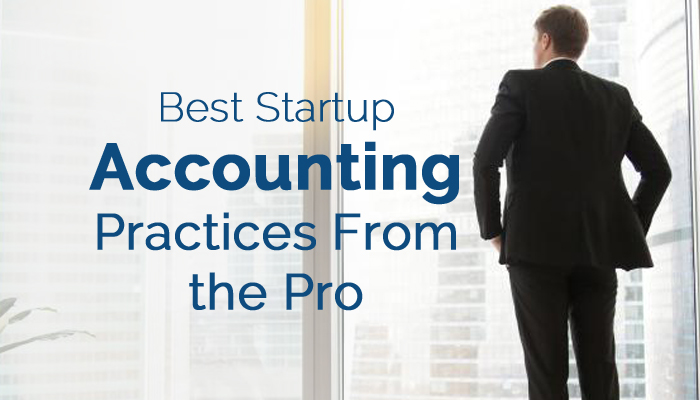
1000+
customers

50+ countries
across the world

Outsourcing leader
since 2008

Technology-driven
services

Stringent
quality processes
Best Startup Accounting Practices for Good Financial Growth From the Experts
Last updated: 19 Oct, 2023 By Alika Cooper | 6 Minutes Read

Being a startup accounting firm, keeping track of your finances is highly essential to stay competitive in the agile market. However, many owners face obstacles to take complete control over their financial process as they lack time and expertise, which triggers heavy penalties from the IRS.
Best Practices for Startup Accounting Firm by Experts

1. Shortens the Cash Conversion Cycle
C. Zachary Meyers, CPA, CVA
The best accounting practices for start-ups entail any activity or strategy that reduces the cash conversion cycle. No accounting practice will ever be as beneficial as strong operational practices.
More specifically, one must maximize and expedite the cash inflow (revenue) while minimizing and deferring the cash outflow (expenses). While it sounds like common sense, many startups ignore these principles that impact a company.
Plain and simple, most businesses eventually fail or shut down. That’s just a fact, and it is true for even those businesses, who are generally successful.
Therefore, the operation of a business or “staying in business” requires receiving payments from clients faster and at a higher volume than the rate at which the business is spending money.
When a company starts to spend more than it earns or spends money faster than the rate it can make money, this pattern will eventually cause business failure. While many say you have to spend money to make money, this part is only true as taking the time to research, plan, and facilitate growth does not require cash outflow.
Startups must enable or require payment for their services to get paid faster and in full. Simply put, facilitating electronic payment or implementing pre-payment for goods or services does not cost much or maybe nothing at all. Ditching a brick and mortar mindset is often beneficial, as one can minimize cash outflows like rent or property taxes by focusing more on selling or facilitating the purchase of your good or service online. Rarely can a physical location (like a store) generate more revenue at less cost than an online business.
Branding through the establishment of online search engine optimization or social media is far more effective and less costly than investing hundreds of dollars into a neon sign that can be seen from the interstate. Startups must make these types of decisions daily to survive.

2. Choose the Right Accounting Software
Steven Shapiro – Steven L Shapiro, CPA, Inc.
Basically, a startup business needs to run its accounting system, usually QuickBooks in one form or another, as Accrual basis, not a Cash Basis.
This will allow them to see what their outstanding accounts receivable (future cash inflow) and accounts payable (future cash outflow) are and manage their most valuable resource – CASH.
The best advice I have other than to start a business without having enough cash or cash in reserve is a recipe for major amounts of stress and anxiety. CASH IS KING and without enough cash to make it through the startup process and the inevitable dips may be the biggest means of failure.

3. Analyze Financial Reports Keenly
Bryan Thompson CFO at Anchor Loans LP
I would say that the most important accounting practice to establish from the beginning for a startup is the mechanism/system to capture, analyze, and report on financial and operational data. If you get that right, you can always adapt to it later. If you get it wrong, there is little hope of having sufficient visibility.

4. Keep Accounting Data Up-to-Date
Harlan Kahn CPA – Business Advisor, Profitability Consultant, and CPA
- Start off with good habits
- Record all key performance indicators
- Make a profit on everything you sell
- Have a business plan, work the plan, correct and adjust as you go
- Try to have fun every day

5. Organize a Referral Program
John I. Harrison, CPA – Executive Director at SASBA
I firmly believe that a well-tested referral system is the first order a CPA should have when starting their practice. In this way, one can connect with right people that will ultimately enhance your client base.

6. Seek Advice from Accounting and Legal Experts
Mark W. Carrison – Partner at CPA Firm
Some aspects that startups should consider for good financial growth:
-
- Financial and tax projections
- Retain a CPA and Lawyer to help you address financial and legal tactics strategically
- Cash flow analysis
- Bookkeeping
- Job order cost review
Bottom line
Accounting for startups is not as easy as it seems. You need to wear several hats, but staying on top of your finances can help you reap long-term success.
Don’t let the accounting workload become a hurdle in your path to success. Join hands with Cogneesol and focus on business growth strategies, leaving all the accounting headaches to our experts. Contact us now at +1 833-313-3143 or email us at [email protected]!
Latest Blogs

This site is protected by reCAPTCHA. Google's Privacy Policy
and Terms of Service apply.








